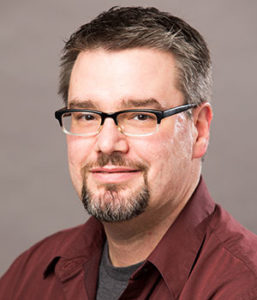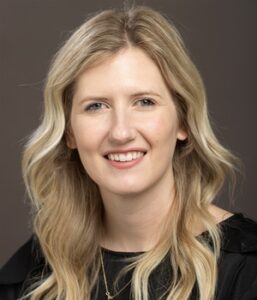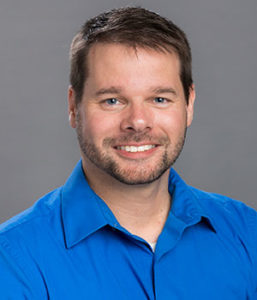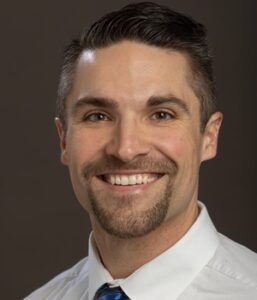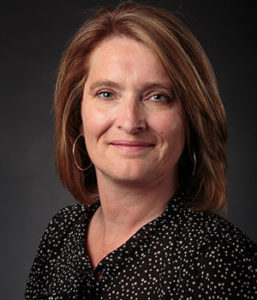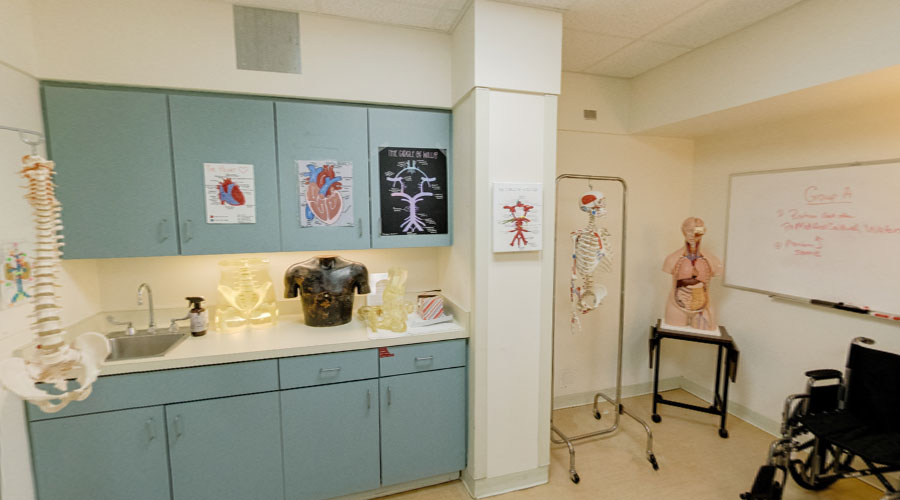Biomedical Sciences: Radiologic Technology BS
The Radiologic Technology program is a rigorous four-year undergraduate program that requires completing four or more semesters of preclinical coursework to prepare for the two-year professional and clinical training.
Program Type
Major
Program Format
On Campus
Radiologic Technologists…
“produce quality medical images of the human body to aid the physician in diagnosis, prevention, and treatment of disease.”
– American Society of Radiologic Technologists
Radiography integrates scientific knowledge, technical skills, patient interaction and compassionate care resulting in diagnostic information. Radiographers recognize patient conditions essential for successful completion of the procedure.
Your work as a radiologic technologist will take you to a wide variety of settings, including hospitals, clinics, physician’s offices, medical laboratories, diagnostic laboratories and public health facilities.
Your patients will come from all walks of life and from all age groups.
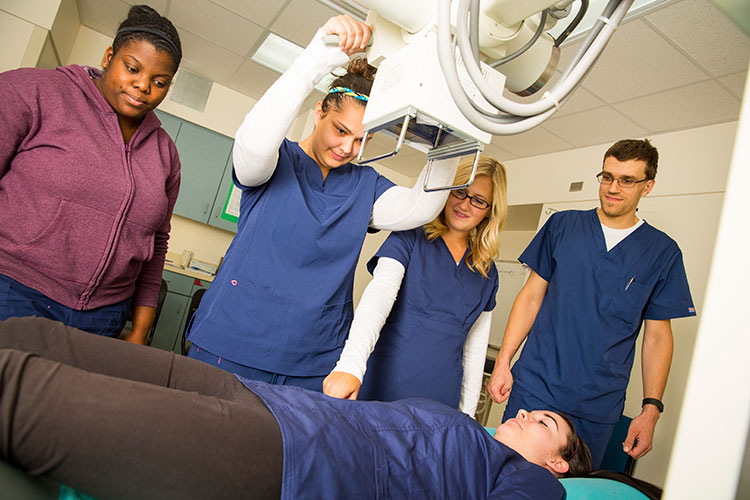
You may apply to up to five clinical affiliate options in the greater Milwaukee area or Madison, Wisconsin:
- UW-Milwaukee sponsored Radiologic Technology Program
Academic classes provided ON campus and clinical experience provided OFF campus through affiliations with multiple hospitals and clinics in the Greater Milwaukee area. - Froedert School of Radiologic Technology (Milwaukee, Wisconsin)
Academic classes and clinical experience provided OFF campus by the clinical affiliate. - University of Wisconsin Hospital & Clinics Radiologic Technology School (Madison, Wisconsin)
Academic classes and clinical experience provided OFF campus by the clinical affiliate. - All Saint’s School of Radiologic Technology (Racine, Wisconsin)
Academic classes and clinical experience provided OFF campus by the clinical affiliate. - St. Joseph’s School of Radiologic Technology (Milwaukee, Wisconsin)
Academic classes and clinical experience provided OFF campus by the clinical affiliate.
Upon successful completion of the program, you are eligible to write the national registration exam offered through the American Registry of Radiologic Technologists.
Employment Outlook
Earnings
The median annual wage for radiologic technologists was 77,660 in May 2024. The lowest 10% earned less than $52,360, and the highest 10% earned more than $106,990.
Expected Growth
Employment of radiologic technologists is projected to grow 6% from 2023 to 2033, faster than the average for all occupations.
As the baby boomer population grows older, there may be an increase in medical conditions, such as cancer and Alzheimer’s disease, which require imaging as a tool for making diagnoses.
Successful Alumni
The School of Biomedical Sciences & Health Care Administration has many successful alumni. These alumni have taken their degrees and have excelled in their careers.
Visit our Alumni page and be inspired by where a health sciences degree can take you.
Related Programs
Application requirements for students WITH a UWM College of Health Professions & Sciences background
Admission Criteria
- You will complete freshman and sophomore years on campus. If you are accepted into the professional training component, you will complete your junior and senior years through the UWM professional training program or at one of the clinical affiliate professional training sites. The professional training is time-intensive, requiring you to commit to a 40+ hour week.
- Completion of all required courses and electives by May prior to the following fall start of the professional training.
- The College of Health Professions & Sciences Office of Student Affairs and the UWM radiologic technology program director will review your application materials and transcripts to verify that the admission criteria have been satisfied.
Entry into professional training is competitive and dependent upon:
- Completion of UWM’s General Education Requirements (GER).
- Completion of all required courses and electives in the freshman and sophomore semesters by May prior to the following fall start of the professional training.
- Minimum UWM cumulative GPA of 2.5.
- Earning a grade of “C” or better in PHYSICS 110, CHEM 100, BIOSCI 202, BIOSCI 203, BMS 301, BMS 302, BMS 303, BMS 304, and BMS 305.
Additional requirements vary by clinical training site and program. You should meet with your academic advisor for more detailed information on progressing into the professional training.
Application Process
- Students attend a mandatory information session that walks them through how to apply to the professional training program (clinicals). At the beginning of the fall semester, an email is sent to RT intended students to inform you that the program is accepting applications for formal admission to the major.
- After attending the mandatory application information meeting, application materials will be available on Canvas. You need to read the materials and pass a test with 100% to gain access to the application for placement.
- Application is submitted in Canvas. The deadline to apply for admission is 4 pm on Dec. 1. Applications will not be accepted after the deadline.
- Following the submission of fall semester grades, an audit will be performed by the College of Health Professions & Sciences Office of Student Affairs. To be eligible for clinical placement, all prerequisite coursework must be completed by the end of the spring semester. Your advisor will provide the following notifications:
- Applicants who do not demonstrate that they have completed all prerequisite courses or who are not registered for prerequisite courses in progress are required to register for the missing courses.
- Applicants who do not meet the 2.5 GPA requirements are not eligible for clinical placement.
- Applicants who do not demonstrate that they will complete all prerequisite courses by the end of the Spring semester are not eligible for clinical placement.
UWM Radiologic Technology Program Director
The College of Health Professions & Sciences Office of Student Affairs and the radiologic technology clinical coordinator will review your application materials and transcripts to verify that the admission criteria have been satisfied.
The completed application materials, letters of recommendation and a copy of your college transcripts will be forwarded to the program directors at the clinical affiliate sites.
Interviews for Professional/Clinical Training
The program directors will review the application materials and contact you to set up an interview.
Clinical Placements
Affiliate sites make the final decisions on placements and will notify you by mail. Eligibility is conditional; that is, you must complete the required coursework and maintain a minimum UWM cumulative GPA of 2.50.
You complete four or more semesters of preclinical coursework to prepare for the two-year professional and clinical training.
Upon successful completion of the Radiologic Technology program, you are eligible to write the national registration exam offered through the American Registry of Radiologic Technologists.
Important Information
- You need to schedule an appointment with your advisor, at 414-229-5047, to review transcripts and complete a degree audit to ensure your academic records are in order.
- A background check, physical examination, proof of vaccinations and a drug screening are required prior to starting clinical training.
- The clinical affiliate sites require you to have health insurance while in the clinical rotation.
- Limited employment during the Summer session is recommended.
- Books and miscellaneous fees for the clinical training will cost approximately $1,000.
- Rotation schedules, vacations and other time off are matters that are decided individually by each clinical site. The UWM academic calendar does not apply.
- You are expected to register for classes at UWM at the beginning of the summer, fall and spring semesters.
Essential Functions
These are the essential nonacademic requirements that you must master to successfully participate in the Radiologic Technology program and become employable. Corrective devices and reasonable accommodations may be used to satisfy these essential functions.
Physical Characteristics
- Physical stamina and the ability to endure long, continuous periods of duty without incapacitating fatigue and disability.
- Visual acuity to examine images/exposed films for detail and to observe physical changes in the patient’s condition.
- Conversational English and medical language skill sufficient to communicate with patients, physicians, staff.
- Adequate speech and hearing ability to give instructions to and receive communication from patients and discern audible sounds.
- Demonstrate sufficient manual dexterity to perform such required tasks as: performing procedures safely and accurately; operating delicate instruments; manipulating tools.
- Manual dexterity to adjust machine controls, attach and adjust supportive devices and assist patient into position for the procedure/exam.
- Satisfactory health as verified by a physician.
Mental & Emotional Characteristics
- Be able to work under stress and maintain self-control.
- Have both patience and tact in dealing with others.
- Be emotionally stable.
- Be able to organize and plan work in a logical sequence.
- Be able to use sound judgment in making decisions.
- Be able to adapt to new situations.
- Demonstrate problem-solving skills.
Personal Characteristics
- Neat in appearance
- Positive attitude
- Enjoy working with others
- Able to follow instructions
- Willing to accept responsibility
- Accountability
- Empathy for patients
- Service oriented
- Good moral character
Admission Requirements for students WITHOUT a UWM CHPS background (transfer students)
Many courses can be transferred to meet specific program and General Education Requirements (GER) needed for graduation.
If you plan to transfer into any College of Health Profession & Sciences major, you should make an appointment to meet with an advisor to plan your curriculum, at 414-229-5047.
To schedule an advising appointment, call 414-229-5047 or visit Cunningham Hall, Room 135
When should I meet with my advisor?
You are encouraged to meet with your advisor at least once per semester to ensure timely progress to graduation.
- Enrolling for spring semester?
Schedule an appointment with your advisor in October or November. - Enrolling for fall semester?
Schedule an appointment with your advisor in March or April.
You are also welcome to schedule an appointment with your advisor at any time to discuss academic challenges, career opportunities or any other questions.
How can my advisor help me?
The College of Health Professions & Sciences boasts professional academic advisors who understand the challenges of balancing academics, work, family and the social aspects of college life. Advisors partner with you to:
- Explore your academic and career interests
- Plan the sequence of your courses
- Prepare for course enrollment
- Access tutoring and other academic support
- Identify opportunities for campus involvement
- Connect you to campus resources
- Plan for graduation
- Clinical Assistant Professor, Biomedical Sciences Program, Radiologic Technology Program
- cordas@uwm.edu
- 414-251-5648
- Northwest Quadrant B B6535
- Head of School, School of Biomedical Sciences & Health Care Administration
- Associate Dean for Academic Affairs
- Associate Professor, Biomedical Sciences
- dollj@uwm.edu
- 414-229-4840
- Enderis Hall 899
- Clinical Assistant Professor, Biomedical Sciences Program, Radiologic Technology Program
- gostoms5@uwm.edu
- Northwest Quadrant B 6521
- Associate Professor, Biomedical Sciences
- Executive Committee Chair
- nardelld@uwm.edu
- 414-251-9074
- Enderis Hall 493
- Clinical Assistant Professor, Radiologic Technology Program
- rentmees@uwm.edu
- Northwest Quadrant B 6525
- Clinical Associate Professor, Radiologic Technology Program Director, Diagnostic Imaging
- wisniews@uwm.edu
- 414-251-8367
- Northwest Quadrant B 6515

